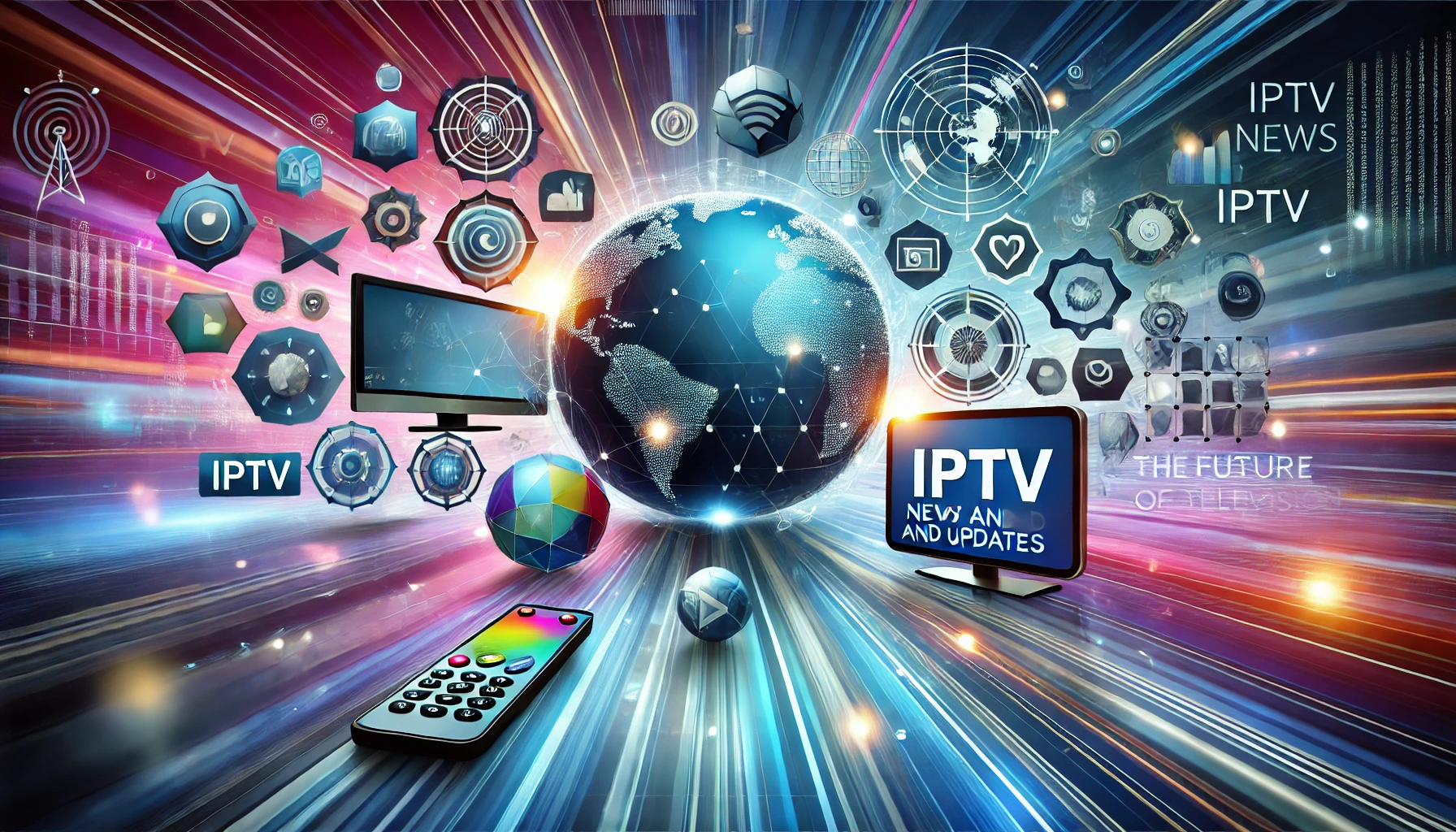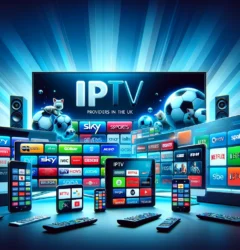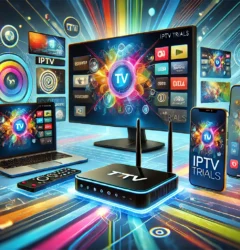25 Jun

IPTV News and Updates: The Future of Television
Introduction to IPTV
What is the IPTV?
IPTV, or Internet Protocol Television, is a system where television services are delivered using the internet protocol suite over a packet-switched network such as a LAN or the Internet. This is in contrast to traditional terrestrial, satellite, and cable television formats. IPTV allows users to stream live television and on-demand content directly to their devices, such as smart TVs, smartphones, and tablets, offering a more flexible and interactive viewing experience source.
Why IPTV is Gaining Popularity
IPTV is becoming increasingly popular due to several key advantages over traditional television formats. These advantages include:
- On-Demand Content: Users can watch their favorite shows and movies whenever they want, without being tied to a broadcast schedule.
- High-Quality Streaming: Advances in technology allow for high-definition and even 4K streaming, providing a superior viewing experience.
- Interactive Features: IP TV offers features like pause, rewind, and fast forward, as well as interactive program guides and personalized content recommendations.
- Cost-Effectiveness: IP TV services often cost less than traditional cable or satellite TV subscriptions, making it an attractive option for budget-conscious consumers source.
Recent Developments in IPTV Technology
Advances in Streaming Technology
The past few years have seen significant advances in streaming technology, which have greatly enhanced the IPTV experience. These developments include:
- Higher Resolution Streams: IP TV providers are now offering content in 4K and 8K resolutions, delivering stunning picture quality source.
- Reduced Latency: Innovations in streaming technology have minimized buffering and reduced latency, ensuring a smoother and more enjoyable viewing experience.
- Improved Compression Algorithms: New compression algorithms allow for higher quality streams at lower bitrates, reducing the strain on bandwidth and enabling better performance even on slower internet connections source.
Integration with Smart Devices
IP TV is becoming increasingly integrated with smart devices, making it easier than ever for users to access their favorite content. Key developments in this area include:
- Smart TV Integration: Many modern smart TVs come with built-in IP TV apps, allowing users to stream content without the need for additional hardware.
- Mobile and Tablet Compatibility: IP TV services are available on smartphones and tablets, enabling users to watch their favorite shows on the go source.
- Voice Control and AI: Integration with voice assistants like Amazon Alexa and Google Assistant allows users to control their IP TV services using voice commands, while AI-driven recommendations help users discover new content source.
IPTV Market Trends
Growth of IPTV Subscribers
The IP TV market has been experiencing rapid growth, with the number of subscribers increasing year over year. According to recent data:
- Global IPTV Subscribers: As of 2023, there are over 300 million IP TV subscribers worldwide, up from 200 million in 2018 source.
- Regional Growth: The Asia-Pacific region leads in terms of subscriber growth, followed by Europe and North America.
Key Players in the IPTV Market
Several companies dominate the IP TV market, offering a wide range of services to consumers. Some of the key players include:
| Company | Services Offered | Market Share |
|---|---|---|
| Netflix | Streaming of movies and TV shows | 30% |
| Amazon Prime | Video streaming, live TV, and on-demand | 20% |
| Hulu | Live TV, on-demand content | 15% |
| Disney+ | Movies and TV shows, especially for kids | 10% |
| AT&T TV | Live TV and on-demand streaming | 5% |
IPTV Regulations and Policies
Global IPTV Regulatory Landscape
The regulatory environment for IPTV varies significantly across different regions. Key aspects include:
- United States: The FCC regulates IPTV services, focusing on net neutrality and content licensing issues source.
- European Union: The EU has stringent regulations to protect consumer rights and ensure fair competition among service providers source.
- Asia: Countries like China and India have specific regulations governing content distribution and service quality for providers source.
Anti-Piracy Measures
Piracy is a major concern in the IPTV industry, and various measures are being taken to combat it:
- Technological Solutions: IPTV providers use advanced encryption and digital rights management (DRM) technologies to protect their content source.
- Legal Actions: Governments and industry bodies are cracking down on illegal IPTV services, with severe penalties for offenders source.
- Awareness Campaigns: Educating consumers about the risks and legal consequences of using pirated IPTV services is a key strategy in reducing piracy source.
IPTV Content and Programming
Exclusive IPTV Channels and Shows
One of the major draws of IPTV is the availability of exclusive content that cannot be found on traditional TV networks. Examples include:
- Netflix Originals: Popular series like “Stranger Things” and “The Crown” source.
- Amazon Prime Exclusives: Shows like “The Marvelous Mrs. Maisel” and “The Boys” source.
- Hulu Originals: Series like “The Handmaid’s Tale” and “Castle Rock” source.
Customizable Viewing Experiences
IPTV offers a highly customizable viewing experience, allowing users to tailor their content to their preferences:
- Personalized Recommendations: AI-driven algorithms suggest shows and movies based on user preferences and viewing history source.
- Interactive Features: Users can interact with their content through features like voting, commenting, and sharing.
- Multi-Screen Viewing: allows users to watch different channels or shows on multiple devices simultaneously source.
The Future of IPTV
Predicted Trends for the Next 5 Years
The future of IPTV looks bright, with several key trends expected to shape the industry:
- Increased Adoption of 5G: The rollout of 5G networks will enhance the quality and speed of IPTV streams, enabling new features and improved performance source.
- Expansion of Content Libraries: IPTV providers will continue to expand their content offerings, including more original and exclusive programming.
- Enhanced User Interfaces: Improvements in user interface design will make it easier for users to discover and enjoy content.
IPTV and the Impact of 5G
The advent of 5G technology is set to revolutionize IPTV:
- Higher Speeds: 5G offers significantly faster internet speeds, reducing buffering and enabling seamless 4K and 8K streaming source.
- Lower Latency: Reduced latency will enhance live streaming experiences, making IP TV a viable option for live sports and events.
- Increased Accessibility: 5G will make high-quality IP TV services available to more users, even in areas with previously poor internet connectivity source.
Case Studies and Success Stories
Successful IPTV Implementations
Several companies have successfully implemented IP TV solutions, leading to increased subscriber satisfaction and market growth:
- Comcast Xfinity: By offering a wide range of channels and on-demand content, Comcast has attracted millions of IP TV subscribers source.
- AT&T TV: AT&T’s IP TV service provides a comprehensive viewing experience with live TV, on-demand content, and DVR capabilities source.
User Testimonials and Reviews
Real-life user experiences highlight the benefits and potential of IP TV:
- John, 35, New York: “Switching to IP TV has been a game-changer. I love the flexibility and the ability to watch my favorite shows on my schedule.”
- Emma, 28, California: “The quality of the streams is amazing, and the personalized recommendations help me discover new content I enjoy.”
Challenges and Solutions in the IPTV Industry
Technical Challenges
The IPTV industry faces several technical challenges, including:
- Bandwidth Requirements: High-quality streaming requires significant bandwidth, which can be a challenge in areas with limited internet infrastructure.
- Service Reliability: Ensuring consistent and reliable service can be difficult, particularly during peak usage times.
- Device Compatibility: Ensuring compatibility across a wide range of devices requires ongoing development and support source.
Solutions:
- Adaptive Streaming: Using adaptive streaming technologies to adjust quality based on available bandwidth.
- Content Delivery Networks (CDNs): Utilizing CDNs to distribute content more efficiently and reduce latency source.
- Cross-Platform Development: Developing apps and services that are compatible with multiple devices and operating systems.
Market Competition
The IP TV market is highly competitive, with many providers vying for market share. Strategies to stand out include:
- Unique Content: Offering exclusive and original content that cannot be found elsewhere.
- User Experience: Investing in user interface design and customer support to enhance the overall experience.
- Innovative Features: Developing new features and functionalities that differentiate the service from competitors source.
IPTV News and Updates
Latest Announcements and Releases
Recent news in the IPTV industry includes:
- New Service Launches: Companies like Disney+ and Apple TV+ have entered the market with unique content offerings source.
- Technology Upgrades: Providers are rolling out new features, such as improved user interfaces and enhanced streaming quality.
- Partnerships and Acquisitions: Mergers and partnerships are reshaping the industry landscape source.
Upcoming Trends and Predictions
Experts predict several trends for the future of IP TV:
- Increased Focus on Security: Enhanced security measures to protect against piracy and data breaches.
- AI and Machine Learning: Greater use of AI to personalize content recommendations and improve user experiences.
- Expansion into New Markets: IPTV services will continue to expand into emerging markets, driven by the availability of affordable internet access source.
Conclusion
Summary of Key Points
In summary, is transforming the way we consume television, offering a flexible, high-quality, and customizable viewing experience. Key developments in technology, market trends, and regulatory landscapes are shaping the future of the industry.
Call to Action
If you haven’t explored IP TV yet, now is the perfect time. Subscribe to our blog for more updates and news on the latest trends in IP TV.
FAQs about IPTV
Common Questions Answered
- What is IPTV? IPTV stands for Internet Protocol Television, a system for delivering television content over the internet.
- How does IPTV work? IPTV streams content using the internet protocol suite, allowing users to watch live TV and on-demand content on various devices.
- Is IPTV legal? Yes, IPTV is legal, but it is important to use licensed services to avoid piracy issues source.
- What are the benefits of IPTV? IPTV offers on-demand content, high-quality streaming, interactive features, and cost-effectiveness compared to traditional TV services.
By following these comprehensive insights and updates, you’ll be well-informed about the exciting world of IPTV and its future trajectory.


